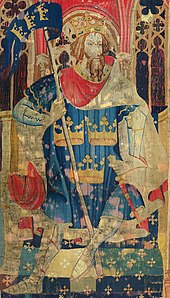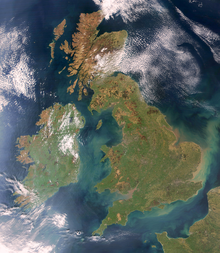| Revision as of 14:25, 24 November 2014 editGob Lofa (talk | contribs)Extended confirmed users18,321 edits Undid revision 626551614 by Snowded (talk) Restoring blanked text - this is pretty straightforward← Previous edit |
Revision as of 14:35, 24 November 2014 edit undoGob Lofa (talk | contribs)Extended confirmed users18,321 edits Delink already linked, reword, removing dodgy (and irrelevant) interpretation of Irish historyNext edit → |
| Line 3: |
Line 3: |
|
], the king of the ancient ], depicted as one of the ] in tapestry, c. 1385. The legend of King Arthur as a warrior ruler and British hero as depicted by ] in '']'' laid the foundation of British nationalism.]] |
|
], the king of the ancient ], depicted as one of the ] in tapestry, c. 1385. The legend of King Arthur as a warrior ruler and British hero as depicted by ] in '']'' laid the foundation of British nationalism.]] |
|
] and ].]] |
|
] and ].]] |
|
'''British nationalism''' asserts that the ] are a ] and promotes the cultural unity of the British,{{sfn|Motyl|2001|pp=62-63}}<ref>Guntram H. Herb, David H. Kaplan. Nations and Nationalism: A Global Historical Overview: A Global Historical Overview. Santa Barbara, California, USA: ABC-CLIO, 2008.</ref> in a definition of ] that includes people of ], ], ], ] and ] descent.{{sfn|Motyl|2001|pp=62-64}} British nationalism is closely associated with ], which seeks to uphold the political union that is the ], or strengthen the links between the countries of the ].<ref name="Mil133">{{harvnb|Miller|2005|p=133}}.</ref> |
|
'''British nationalism''' asserts that the ] are a ] and promotes the cultural unity of the British,{{sfn|Motyl|2001|pp=62-63}}<ref>Guntram H. Herb, David H. Kaplan. Nations and Nationalism: A Global Historical Overview: A Global Historical Overview. Santa Barbara, California, USA: ABC-CLIO, 2008.</ref> in a definition of ] that includes people of ], ], ], ] and ] descent.{{sfn|Motyl|2001|pp=62-64}} British nationalism is closely associated with ], which seeks to uphold the political union that is the ], or strengthen the links between the countries of the United Kingdom.<ref name="Mil133">{{harvnb|Miller|2005|p=133}}.</ref> |
|
|
|
|
|
British nationalism's unifying identity descends from the ] who dwelt on the island of ].<ref>Guntram H. Herb, David H. Kaplan. Nations and Nationalism: A Global Historical Overview: A Global Historical Overview. Santa Barbara, California, USA: ABC-CLIO, 2008.</ref> British nationalism grew to include people outside of Great Britain, on the island of ], because of the ], which declared that the crown of Ireland was to be held by the ruling monarch of ]. Also there were ] calls for unity with Britain.<ref>Brendan Bradshaw, Peter Roberts. British Consciousness and Identity: The Making of Britain, 1533-1707. P. 302.</ref> However with the ] a schism arose in the British Isles between ] and ] that was especially strong in Ireland, that led to ] and demands for Irish independence from Britain, the largely Catholic ] was granted independence by the British government, while the largely Protestant ] remained within the United Kingdom.{{Citation needed|date=February 2014}}{{Dubious|date=February 2014}} |
|
British nationalism's unifying identity descends from the ] who dwelt on the island of ].<ref>Guntram H. Herb, David H. Kaplan. Nations and Nationalism: A Global Historical Overview: A Global Historical Overview. Santa Barbara, California, USA: ABC-CLIO, 2008.</ref> British nationalism grew to include people outside Great Britain, in ], because of the ], which declared that the crown of Ireland was to be held by the ruling monarch of ] as well as ] calls for unity with Britain.<ref>Brendan Bradshaw, Peter Roberts. British Consciousness and Identity: The Making of Britain, 1533-1707. P. 302.</ref> |
|
|
|
|
|
It is characterised as a "powerful but ambivalent force in British politics".<ref>{{harvnb|Smith|Smith|White|1988|p=61}}.</ref> In its moderate form, British nationalism has been a ], emphasizing both cohesion and diversity of the people of the United Kingdom, its dependencies, and its former colonies.{{sfn|Motyl|2001|pp=64}} Recently however, ] nationalism has arisen based on fear of Britain being swamped by immigrants; this anti-immigrant nativist nationalism has been present in the ] and other nativist nationalist movements.{{sfn|Motyl|2001|pp=64}} Politicians, such as ] ] of the Conservative Party and his direct predecessor ] of the Labour Party, have sought to promote British nationalism as a progressive cause.<ref>http://www.theguardian.com/politics/2014/jun/25/gordon-brown-independent-scotland-no-more-equal-progressive-alex-salmond-policies</ref><ref>Conservative Party leader David Cameron advocates liberal or civic British nationalism: "Being British is one of the most successful examples of inclusive civic nationalism in the world." http://www.conservatives.com/News/Speeches/2006/09/Cameron_I_will_never_take_Scotland_for_granted.aspx www.conservatives.com Official party site (26 September 2006)</ref> |
|
It is characterised as a "powerful but ambivalent force in British politics".<ref>{{harvnb|Smith|Smith|White|1988|p=61}}.</ref> In its moderate form, British nationalism has been a ], emphasizing both cohesion and diversity of the people of the United Kingdom, its dependencies, and its former colonies.{{sfn|Motyl|2001|pp=64}} Recently however, ] nationalism has arisen based on fear of Britain being swamped by immigrants; this anti-immigrant nativist nationalism has manifested politically in the ] and other nativist nationalist movements.{{sfn|Motyl|2001|pp=64}} Politicians, such as ] ] of the Conservative Party and his direct predecessor ] of the Labour Party, have sought to promote British nationalism as a progressive cause.<ref>http://www.theguardian.com/politics/2014/jun/25/gordon-brown-independent-scotland-no-more-equal-progressive-alex-salmond-policies</ref><ref>Conservative Party leader David Cameron advocates liberal or civic British nationalism: "Being British is one of the most successful examples of inclusive civic nationalism in the world." http://www.conservatives.com/News/Speeches/2006/09/Cameron_I_will_never_take_Scotland_for_granted.aspx www.conservatives.com Official party site (26 September 2006)</ref> |
|
|
|
|
|
==Nationalism and unionism== |
|
==Nationalism and unionism== |
It is characterised as a "powerful but ambivalent force in British politics". In its moderate form, British nationalism has been a civic nationalism, emphasizing both cohesion and diversity of the people of the United Kingdom, its dependencies, and its former colonies. Recently however, nativist nationalism has arisen based on fear of Britain being swamped by immigrants; this anti-immigrant nativist nationalism has manifested politically in the British National Party and other nativist nationalist movements. Politicians, such as British Prime Minister David Cameron of the Conservative Party and his direct predecessor Gordon Brown of the Labour Party, have sought to promote British nationalism as a progressive cause.



